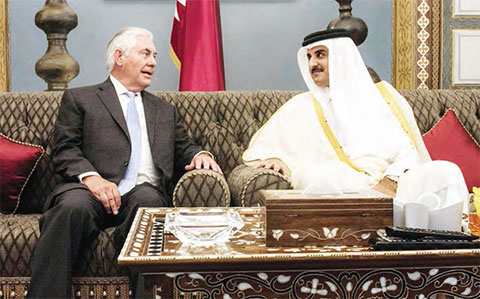Qatar, US ink counterterror deal - Quartet, US FMs to meet
 DOHA: US Secretary of State Rex Tillerson (left) meets Qatar’s Emir Sheikh Tamim bin Hamad Al-Thani at the Sea Palace residence yesterday. — AFP
DOHA: US Secretary of State Rex Tillerson (left) meets Qatar’s Emir Sheikh Tamim bin Hamad Al-Thani at the Sea Palace residence yesterday. — AFP
KUWAIT/DOHA: HH the Amir of Kuwait Sheikh Sabah Al- Ahmad Al-Jaber Al-Sabah yesterday expressed “bitterness” and is “extremely concerned” over “unprecedented developments” in the Gulf crisis. The Amir appreciates the positive reactions and messages of support of Kuwait’s mediation efforts regarding the stalemate, displayed by Kuwaiti nationals, Gulf states and the international community, read an Amiri Diwan statement.
These expressions of support have “relieved” him from the resulting pain and “increased our determination” to resolve the matter, said HH the Amir, who is leading mediation efforts in the crisis involving several Arab countries. The Amir warned that the Gulf Cooperation Council’s accomplishments, based on the aspirations of its people, “cannot be compromised, and should be maintained and adhered to”. “We will not surrender our historic responsibilities (towards the bloc) and we will be loyal to it until we overcome these developments,” he underlined, stressing that the related parties themselves can only resolve this crisis.
Meanwhile, Qatar and the United States signed a deal yesterday on combatting “terrorism” as visiting US Secretary of State Rex Tillerson pursued efforts to resolve the Gulf diplomatic crisis. In Qatar as part of a series of Gulf meetings, Tillerson also said Doha had been “reasonable” in the dispute, which has seen Saudi Arabia, the United Arab Emirates, Bahrain and Egypt cut ties with the emirate over accusations it supports extremism.
Qatar pledged $1 billion to reconstruct Gaza after the 2014 war with Israel, the largest single pledge. Speaking alongside Amadi, Nickolay Mladenov, UN envoy for the Middle East, thanked Qatar for the “commitments you have shown over many years to assist the people of Gaza.” Robert Piper, the UN’s top humanitarian official in the Palestinian territories, told AFP in an interview to mark a new report on living conditions in Gaza all the “indicators are going in the wrong direction”. “We predicted some years ago that Gaza would fast become unlivable on a host of indicators and that deadline is actually approaching even faster than we predicted - from health access, to energy to water,” he said. A 2012 UN report predicted the Palestinian enclave would be “unlivable” by 2020 if nothing was done to ease the blockade. Piper pointed out that power supplies were down to as little as two hours a day in Gaza, where medical care had been slashed and youth unemployment was over 60 percent.
In such circumstances “for most of us that unlivability point has already been passed”, he said. “And yet somehow the Gazans soldier on.” Hamas seized Gaza from secular Palestinian president Mahmoud Abbas’s forces in June 2007, leading Israel to impose a crippling blockade which critics say punishes all of the two million residents indiscriminately. Since 2013 Egypt, the only other country with which Gaza shares a border, has largely closed off its crossing and destroyed hundreds of smuggling tunnels that provided a vital lifeline for the economy while also allegedly being used by Hamas to bring in weapons. — Agencies

